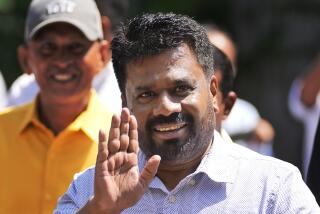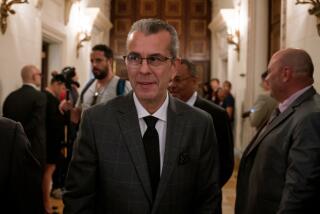Crimes-against-humanity defendant leads Kenya vote
- Share via
NAIROBI, Kenya — A Kenyan politician facing international criminal charges held a slight edge in the country’s presidential election as officials posted complete results early Saturday showing that Deputy Prime Minister Uhuru Kenyatta prevailed by the slimmest of margins, winning 50.03% of the vote.
Kenyatta, son of Kenya’s first president, needed to win more than half the votes to avoid a runoff election with his nearest competitor, Prime Minister Raila Odinga, who is likely to demand a recount.
That the winner was quietly revealed overnight — at 2:35 a.m. — came as somewhat of a surprise. After promising final results from Monday’s election in the morning and then the evening, the election commission said the public would have to wait until 11 a.m. Saturday to hear the final outcome.
To Kenyans, the balloting had been seen as a chance to put behind them past election troubles. Tribal violence after disputed voting in 2007 left more than 1,000 people dead and tainted the country’s reputation as an emerging democracy.
Kenyatta is facing trial at the International Criminal Court on charges of crimes against humanity; he is accused of inciting killings in that rioting.
This election is being closely watched by the United States and other Western powers, anxious about the possibility that a crimes-against-humanity defendant could assume power in one of Washington’s key allies in the fight against terrorism. A disputed election also threatened to trigger new violence between Odinga’s Luo tribe and Kenyatta’s Kikuyu brethren.
At the least, protests and court battles appear likely, indicating the bitter fault lines in an election where Kenyans voted largely along tribal loyalties.
Ballot counting has been marked by technological failures and accusations of irregularities. Despite a relatively transparent process, anxiety deepened as Kenyans crowded around TV screens waiting for results; security forces were deployed in Nairobi on Friday to prevent outbreaks of violence.
Adding to the drama, a Kenyan nongovernmental organization, the African Center for Open Governance, filed a petition in the High Court on Friday to call a halt to vote tallying, claiming the credibility of the process had been undermined by various technical glitches. The group called for the count to start over and votes to be counted manually to renew confidence in the process.
The court refused to accept the petition, saying that it had no jurisdiction on the issue and that it should be heard instead by the separate Supreme Court. The plaintiffs said they would pursue the case there.
The election commission’s chief executive, James Oswago, said at a news conference Friday afternoon that his office was determined that “this process must end today” and that delays were caused in part by the issues and questions raised by the rival political parties, all of which had to be investigated.
“Each and every time we have heard from them that certain things need to be looked into and we have tried to look into those things and we will continue to look into those things,” he said.
The commission chairman, Ahmed Issack Hassan, apologized for the delays and said that the most important thing was to ensure the tallies were correct and that staff members were exhausted after working through the night for days on end.
“We have to moderate between accuracy, speed and human capacity, people getting fatigued, working long hours through the night,” he said. “I want to assure everyone that results you see reflected here today are credible, that they reflect the will of the people.”
Hassan rejected claims Thursday by Odinga’s Orange Democratic Movement that voting tallies in some constituencies were doctored.
The commission introduced electronic technology at various stages of the electoral process, but it was plagued with failures. Voter-recognition technology failed on election day, creating massive lines and voting delays before it was abandoned. A electronic system to convey tallies via computer from regions to the central election center also failed and was dropped.
And at one point, an error in the computer system overstated the number of spoiled votes by a factor of eight.
As the glitches mounted, the clamor of the rival parties who questioned the process also grew, increasing the risk that public confidence in the process could be undermined.
Times wire services contributed to this article.
More to Read
Sign up for Essential California
The most important California stories and recommendations in your inbox every morning.
You may occasionally receive promotional content from the Los Angeles Times.













